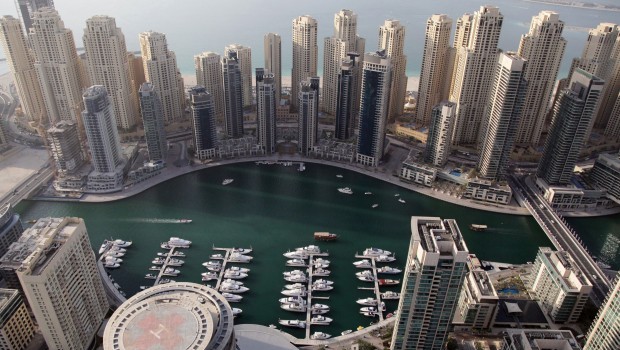
A n image taken from the Burj Khalifa, the world’s tallest skyscraper, on May 21, 2013 shows part of Dubai’s marina. (AFP/Marwan Naamani)
Riyadh, Asharq Al-Awsat—Gulf States are looking for possible ways to control inflation rates in the region, including utilizing the Turkish economic model. Gulf States are set to enter into direct negotiations with Turkey next week regarding the possibility of benefiting from the Turkish economic model in order to curb regional inflation rates. This is a clear indication that the Gulf Cooperation Council (GCC) is seeking to strategically address inflation rates, which have steadily risen across the region over the past three years.
The first meeting of the GCC–Turkey Joint Sub-Committee on Economic and Financial Issues is set to be convened on Monday, July 8 in Ankara. The sub-committee will discuss a number of topics, including organizing a seminar on economic reform and the Turkish experience of remedying inflation.
Informed sources, who spoke to Asharq Al-Awsat on the condition of anonymity, revealed that the GCC states will be seeking, through this sub-committee, to increase the levels of economic trade between Turkey and Gulf states over the next few years. The GCC states are expected to put forward substantial incentives to ensure economic trade is bolstered.
Gulf–Turkish relations have improved in recent years, reflecting in joint cooperation in the political and economic arena, in addition to increased tourism links between Turkey and the GCC. Reports indicate that more and more tourists from the Gulf have been traveling to Turkey, strengthening the Turkish tourism sector.
Financial and economic expert Fahad Al-Mashari informed Asharq Al-Awsat that the rising inflation rate in the Gulf requires urgent solutions. He stressed that inflation rates are beginning to directly affect the finances of middle-to-lower income citizens in the Gulf region.
Mashari said that the GCC decision to look to the Turkish experience to deal with inflation shows that Turkey’s handling of this phenomenon is worth studying. He said: “Turkey is a European country, but inflation levels there are lower than those in the region’s states, and this shows that the Turkish government is following a specific economic and financial policy to deal with this.”
Monday’s joint GCC–Turkey meeting will also discuss the scope of financial and economic cooperation between the two sides, especially regarding the exchange of expertise in dealing with financial problems, mortgages, leasing, and expertise in financial agencies and export insurance.
The meeting comes as a result of the fourth joint ministerial meeting of strategic dialogue between the GCC and Turkey, which was held at the end of January 2012. It called for the establishment of a joint sub-committee to deal with economic, financial, and monetary issues. The sub-committee will prepare recommendations needed for these issues and refer them to the financial and economic cooperation committee and the joint committee for economic cooperation between the GCC and Turkey.
Trade between the GCC and Turkey is expected to reach USD 40 billion by 2020, while the combined GCC and Turkish economies are approximately USD 2 trillion.
The Qatari National Bank reported that the rate of consumer price inflation in the Gulf stood at 3 percent in 2012, down from 3.7 percent the previous year. The International Monetary Fund (IMF), on the other hand, estimates international inflation at 4 percent and inflation in the Middle East and North Africa (MENA) at closer to 10 percent. The IMF reports that inflation in MENA has increased successively over the past four years. Regional inflation rates topped out in 2008 at 11.2 percent, according to the IMF.
Saudi Arabia has the highest inflation in the region at 4.6 percent, followed by inflation rates of 3 percent in Oman, 2.9 percent in Kuwait, and 2.8 percent in Bahrain, followed by Qatar and the UAE. Turkey’s inflation rate hit a nine-month high earlier this year, standing at approximately 6.9 percent; although this is higher than the inflation rate in Gulf States, Ankara has witnessed significant success in reducing this from previous figures.

Trackbacks/Pingbacks